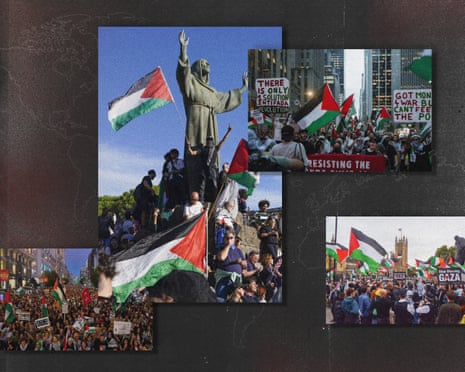Politics
Global Pro-Palestinian Protests Spark Repression and Debate

A recent ceasefire between Hamas and Israel has brought a sense of relief across the Middle East and beyond, yet tensions surrounding the conflict continue to ignite widespread protests globally. Over the past two years, outrage over Israel’s actions in Gaza has led to demonstrations in various cities across Europe and the United States. These protests, marked by significant participation on university campuses and large-scale marches, reflect a growing pro-Palestinian sentiment, despite varied responses from authorities.
In the United States, the rise of pro-Palestinian activism has faced significant pushback. As protests gained momentum, particularly following the establishment of pro-Palestinian encampments at universities like Columbia, many institutions reacted harshly. Reports indicate that police were called to campuses, resulting in thousands of arrests. Activists have criticized the response from the Trump administration, which has utilized allegations of antisemitism to justify stringent measures against free speech and academic freedom. These measures include cutting funding to universities and screening visa applicants for pro-Palestinian views.
In the United Kingdom, the Metropolitan Police have arrested over 1,900 individuals at pro-Palestinian events, primarily for alleged support of Palestine Action, a group classified as a terrorist organization. The UN’s human rights chief, Volker Türk, has condemned the ban on this group as “disproportionate and unnecessary.” Meanwhile, Prime Minister Keir Starmer has faced criticism for labeling pro-Palestinian protests as “un-British” and has suggested further restrictions on demonstrations.
Germany’s protest landscape reveals a complicated relationship between public sentiment and the government’s unwavering support for Israel. Despite a significant turnout of around 100,000 demonstrators at a pro-Palestinian rally in Berlin, authorities have maintained that Israel’s security remains a priority. Activists claim that police tactics have been excessively forceful, infringing on constitutional rights. The legal status of certain protest slogans, such as “from the river to the sea, Palestine will be free,” has sparked debate, with a recent court ruling deeming it antisemitic.
In France, the government’s decision to dissolve the pro-Palestinian collective Urgence Palestine has brought accusations of political motivations behind the crackdown on activism. This move has been met with opposition from various human rights advocates, including Amnesty International, which has reported significant repression of pro-Palestinian voices. The collective has contested the allegations made against it, asserting that it promotes solidarity rather than violence.
Italy has seen a surge in public dissent against Israel’s actions, highlighted by a recent general strike where tens of thousands rallied for peace. The response from authorities has been mixed, with Prime Minister Giorgia Meloni condemning violence but also facing pressure to address public concerns over Israeli military actions. Following the interception of the Global Sumud Flotilla, protests in Rome drew an estimated 250,000 participants, further illustrating the growing discontent among the populace.
In contrast, Ireland has maintained a relatively supportive environment for pro-Palestinian demonstrations. The police force, An Garda Síochána, has often opted for a less confrontational approach, allowing protests to proceed without major incidents. This reflects a broader public sentiment favoring Palestinian recognition, as Ireland joined Spain and Norway in formally recognizing a Palestinian state in May 2024.
Spain has emerged as an exception, where government support for protests has been more evident. Following significant pro-Palestinian demonstrations that disrupted the Vuelta a España cycling race, public opinion remains strongly pro-Palestinian, with approximately 82% of the population believing Israel is committing genocide in Gaza. Prime Minister Pedro Sánchez has expressed admiration for peaceful protesters and has called for reconsideration of Israel’s participation in international sporting events.
As protests continue to spread, the global response to the ongoing conflict remains deeply divided. The varying degrees of repression and resistance highlight a complex landscape where public sentiment, government policy, and international relations intersect.
-

 Health3 months ago
Health3 months agoNeurologist Warns Excessive Use of Supplements Can Harm Brain
-

 Health3 months ago
Health3 months agoFiona Phillips’ Husband Shares Heartfelt Update on Her Alzheimer’s Journey
-

 Science2 months ago
Science2 months agoBrian Cox Addresses Claims of Alien Probe in 3I/ATLAS Discovery
-

 Science2 months ago
Science2 months agoNASA Investigates Unusual Comet 3I/ATLAS; New Findings Emerge
-

 Science1 month ago
Science1 month agoScientists Examine 3I/ATLAS: Alien Artifact or Cosmic Oddity?
-

 Entertainment5 months ago
Entertainment5 months agoKerry Katona Discusses Future Baby Plans and Brian McFadden’s Wedding
-

 Science1 month ago
Science1 month agoNASA Investigates Speedy Object 3I/ATLAS, Sparking Speculation
-

 Entertainment4 months ago
Entertainment4 months agoEmmerdale Faces Tension as Dylan and April’s Lives Hang in the Balance
-

 World3 months ago
World3 months agoCole Palmer’s Cryptic Message to Kobbie Mainoo Following Loan Talks
-

 Entertainment2 months ago
Entertainment2 months agoLewis Cope Addresses Accusations of Dance Training Advantage
-

 Science1 month ago
Science1 month agoNASA Scientists Explore Origins of 3I/ATLAS, a Fast-Moving Visitor
-

 Entertainment4 months ago
Entertainment4 months agoMajor Cast Changes at Coronation Street: Exits and Returns in 2025









